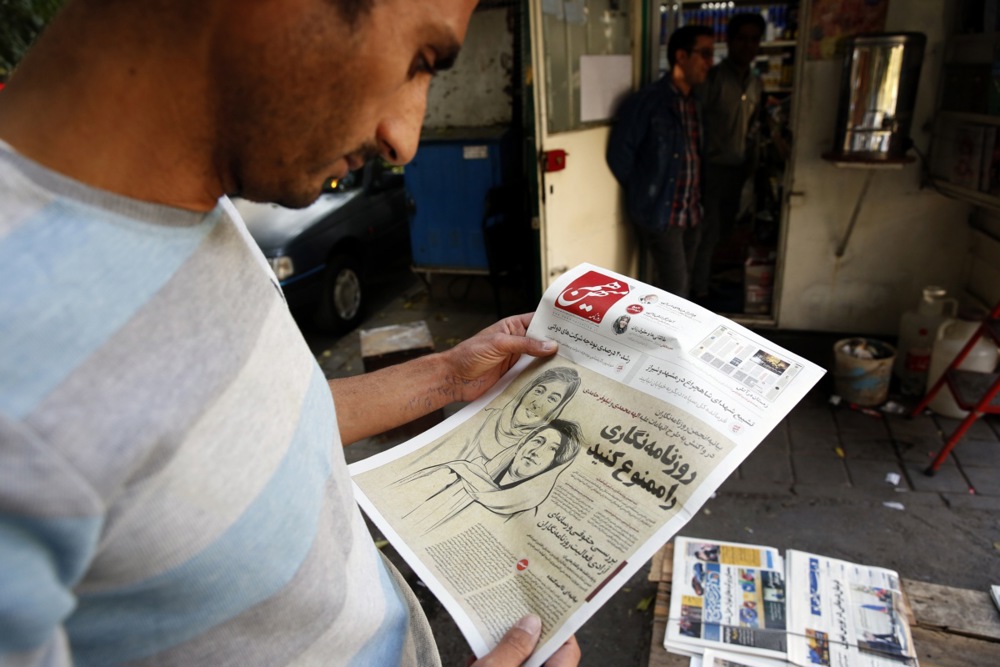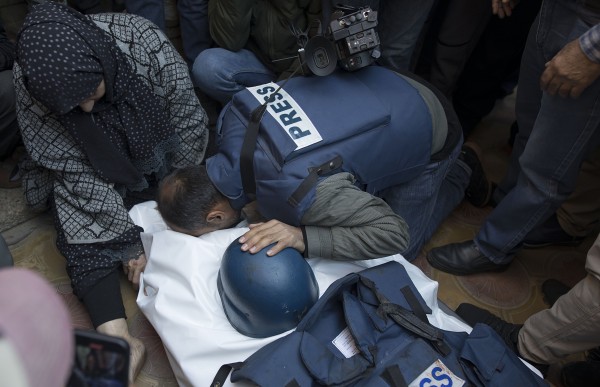The IPI global network strongly condemns the sentencing of Iranian journalists Niloofar Hamedi and Elaheh Mohammadi, two of the first journalists to report on the death of Masha Amini at the hands of the morality police in September 2022, and calls for their immediate release.
On October 22, Hamedi was sentenced to a total of 13 years in prison and Mohammadi to 12. Hamedi received seven years for “collaborating with the U.S. government”, with Mohammadi receiving six years on the same charges. Each journalist also received an additional five-year sentence for “acting against national security” and a one-year sentence for propaganda against the state. Hamedi and Mohammadi are expected to serve at least seven and six years, respectively, of their total sentences, according to reports.
“The sentences handed down to Elaheh Mohammadi and Niloofar Hamedi are deplorable and must be overturned immediately”, IPI Director of Advocacy Amy Brouillette said. “These cases are emblematic of a broader pattern of repression against journalists and media professionals in Iran. The regime has continuously harassed, intimidated, jailed, and persecuted journalists for simply doing their job, showing its complete disregard for fundamental human rights and press freedom.”
Sentenced behind closed doors
Hamedi and Mohammadi were among the first journalists to cover the news of Mahsa Amini’s death, which sparked months-long protests against Iran’s morality police after she died in the hospital. Hamedi, a reporter for Shargh newspaper, published photos of Amini and her parents in the hospital where she died. Mohammadi, a reporter for the Hammihan newspaper, covered Amini’s funeral. Hamedi and Mohammadi were arrested on September 22 and 29, 2022, respectively, and have been detained in Evin prison.
Hamedi’s trial was held in May at the Tehran Revolutionary Court, where she faced charges of “cooperation with hostile countries, collusion with the intention of committing a crime against the country’s security, and propaganda activity against the regime”, according to Hamedi’s lawyer.
Mohammadi’s first trial was also held in May, with her trial concluding on July 26. Her husband, Saeed Parsaee, shared her closing statement to the court on Twitter. “I have been a journalist for 15 years and throughout my professional career, I have not done anything other than speak for people and take a step towards improving their lives”, she said. “I have had no connection with any foreign government and I am proud to stay with the people to be their voice.”
Both trials were held in closed-door hearings, and according to Mohammadi’s lawyers, the journalists were also prevented from speaking on their own behalf.
In a statement on August 1, Massoud Satayshi, a spokesperson for the country’s judiciary, claimed that the case against the journalists had nothing to do with their reporting on Amin but rather for their cooperation with the “hostile government of America”, according to the Iranian Students News Agency. Both the journalists, as well as the United States, have repeatedly denied any ties.
These verdicts came amid a heavy crackdown on independent media since anti-government protests began in September 2022 following Amini’s death, with scores of journalists being arrested and imprisoned. In July 2023, at least four journalists — Behrooz Behzadi, Seyed Mostafa Jaffari, Ali Moslehi and Hossein Yazdi — were arrested in connection to their reporting. Additionally, Marzieh Mahmoodi, a journalist and the editor of Tejaratnews, was sentenced to a year’s internal exile in the northeastern part of the country, and editor of the Qom News website Ali Portabatabaei stood trial on July 31 for “spreading lies” about a wave of poisonings, mostly in girls’ schools.
In another recent case that occurred in September this year, the Tehran Revolutionary Court sentenced journalist Nazila Maroofian to one year in prison and imposed a fine for charges related to “propaganda against the system” and “collusion and gathering.” In response to threats from the Ministry of Intelligence, Maroofian fled to France, where she continues to face the specter of imprisonment on similar charges. Simultaneously, the Iranian authorities have recently imposed a ban on reporting regarding the case of Armita Geravand, a teenage girl who passed away from a head injury inflicted by a hijab police officer. This censorship is aimed at preventing a recurrence of the anti-regime protests witnessed in the aftermath of Mahsa Amini’s death.
In addition to these verdicts of Hamedi and Mohammadi, other journalists have been handed prison sentences. Saeideh Shafiei and Nasim Sultan Beigi, who were also arrested for reporting on the protests in the wake of Amini’s death, were sentenced to four years and three months in prison in July on charges of collusion and propaganda, after being tried in a closed-door trial. Mehrnoush Zarei Henzaki, a third journalist tried in the same case, was acquitted of the charges.



